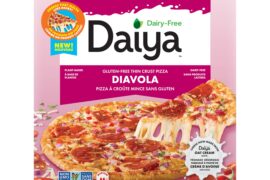Independent family run artisan pizza base producer Deli Conti will soon unveil a new high protein pizza dough at one of the United Kingdom’s largest food and drink trade shows, following support from food innovation scientists.
Experts at the Food Innovation Centre, based at the University of Nottingham’s Sutton Bonington Campus, are focusing on a number of key issues in the food and drink sector, including the increasing demand for alternative sustainable proteins.
In a collaboration project that provides free specialist innovation support to small and medium-size food and drink firms in Nottinghamshire and Derbyshire, the centre offers access to scientists, technicians, and facilities at the university – enabling eligible food and drink firms to seek free advice on how to overcome challenges and develop new ideas.

One of the latest firms to take advantage of the expertise on offer is Nottingham-based pizza base and dough ball producer Deli Conti. The company turned to experts at the Food Innovation Centre as it prepared to develop a high protein pizza dough to satisfy the increasing demand for high protein products.
Now the new frozen product is ready for launch and will be unveiled at Stand J218 during the Food & Drink Expo at the NEC, Birmingham, from April 16-18. Covering the entire food chain, the event will run alongside Foodex, The Ingredients Show, National Convenience Show and Farm Shop & Deli Show.
 Chef Luciano Vendone, who has been making pizza for almost 40 years, will debut high protein pizza dough at the Food & Drink Expo in Birmingham, England. Like other frozen items in the Deli Conti range, the new product will be distributed to foodservice outlets throughout the UK.Chef Luciano Vendone, who runs Deli Conti with his wife Susan, commented: “High protein food is increasing in popularity, and as a supplier to the foodservice sector for many years, we wanted to offer a high protein version of our authentic pizza bases. We needed the input of experts at the Food Innovation Centre and a UKAS accredited laboratory to verify the protein levels so that we can advertise the products as ‘high protein,’ and we are delighted that we have achieved that aim.”
Chef Luciano Vendone, who has been making pizza for almost 40 years, will debut high protein pizza dough at the Food & Drink Expo in Birmingham, England. Like other frozen items in the Deli Conti range, the new product will be distributed to foodservice outlets throughout the UK.Chef Luciano Vendone, who runs Deli Conti with his wife Susan, commented: “High protein food is increasing in popularity, and as a supplier to the foodservice sector for many years, we wanted to offer a high protein version of our authentic pizza bases. We needed the input of experts at the Food Innovation Centre and a UKAS accredited laboratory to verify the protein levels so that we can advertise the products as ‘high protein,’ and we are delighted that we have achieved that aim.”
Deli Conti, which supplies its dough balls, pizza bases and Panizza (a versatile, folded flatbread) to restaurants, bars, hotels, schools, universities and caterers across the East Midlands and beyond, hopes the new dough will appeal to operators of gyms, leisure facilities and other catering outlets that serve high protein food and drink.
 Del Conti’s high protein pizza dough rises to the occasion. The new product is delivered frozen to foodservice operators.In order to be described as ‘high protein’, at least 20% of the energy value of the food must be provided by protein. A claim that a food is a source of protein may only be made when at least 12% of the energy value of the food is provided by protein.
Del Conti’s high protein pizza dough rises to the occasion. The new product is delivered frozen to foodservice operators.In order to be described as ‘high protein’, at least 20% of the energy value of the food must be provided by protein. A claim that a food is a source of protein may only be made when at least 12% of the energy value of the food is provided by protein.
Susan Vendone said: “The project with the Food Innovation Centre has been an immense help to Deli Conti. As a small business, we have the ideas and the capability, but time for research and development is sparse. We knew we could develop a truly high protein pizza base, but it was important to get the nutritional claims correct before going to market.
“The service we received from the team at the Food Innovation Centre at the University of Nottingham was excellent. Their input means we can promote our high protein products knowing that they have been developed with the help of experts in the field of innovation.”
The Food Innovation Centre, which is partially funded by the European Regional Development Fund (ERDF), is a unit of the Division of Food Sciences at the University of Nottingham. Its experts are looking at a range of global issues affecting the food industry, including ways to reduce waste, development of innovative new products and utilization of energy created from by-products, and new protein sources.





